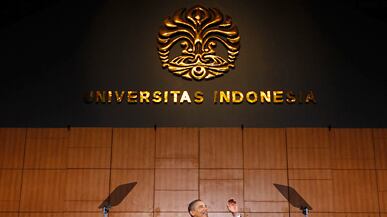As President Obama leaves Indonesia behind, a bit earlier than planned thanks to a plume of volcanic ash that’s been shot in the air by Mt. Merapi, he can be forgiven for waxing nostalgic about the country in which he spent four years of his childhood.
“It’s wonderful to be here,” the president told an adoring crowd in Jakarta. “I will tell you, though, that I barely recognized it as I was driving down the streets. The only thing that was there when I first moved to Jakarta was Sarinah [a shopping mall]. Now it’s one of the shorter buildings on the road.”

When Obama lived in Indonesia, the country was ruled with an iron hand by Sukarno, a ruthless dictator who maintained power by relying on the military to crush his opponents. Sukarno was responsible for the deaths of nearly 1 million Indonesians. His successor, Suharto, who took control of the country in 1968, when Obama was a 7-year-old student at the prestigious Menteg School in Jakarta, was an even more ruthless despot. Suharto’s so-called New Order, which was supported by the United States, led to widespread corruption and human-rights abuses.
Today Indonesia is a completely different country. The fourth most populous nation in the world. The third largest democracy. A gross domestic product of $550 billion and rising. Home to nearly 15 percent of all Muslims on earth, as many Muslims as there are in the entire Arab world. Indonesia is not only the richest, most stable, and most populous county in the Muslim world. It is the Muslim world.
It is for this reason I argued that Obama made a mistake last year by giving his historic “speech to the Muslim world” from Egypt. Then, the president talked of creating a “new beginning” for the Muslim world—an important message, no doubt, but one that was diminished by its being delivered in the wrong country.
Egypt is a repressive and dictatorial state with a “president for life” who is about to pass his throne onto his son. The same can be said of practically every other American ally in the Middle East, including Morocco, Libya, Jordan, Saudi Arabia, and all of the United Arab Emirates.
At a time when most Americans believe that Islamic values and democratic ideals cannot be reconciled, Indonesia has proved otherwise.
Indonesia, on the other hand, is a prosperous and pluralistic democracy—a free country with free elections and a constitution that guarantees religious freedoms for all its citizens. It is a nation that has thrown off the yoke of dictatorship and created a successful indigenous democratic system founded upon the mores and values of its Muslim majority yet equally protective of the rights and freedoms of its many ethnic and religious minorities.
• Tunku Varadarajan: Obama Finds His Footing in IndonesiaBy no measure can Egypt still be considered the center of the Muslim world; no country in the Middle East can legitimately make that claim. This may be the region where Islam was born, but it is also the place where Islam has lately festered and decayed. While Muslims in the Middle East are still fighting each other over whose vision of Islam will rule them all, Muslims in Indonesia have almost effortlessly fused their Islamic identity with the requirements of a modern constitutional state.
True, Indonesia still deals with a tiny radical fringe that claims loyalty to al Qaeda and employs terror to try to overthrow the state. But unlike in many parts of the Middle East, these radical groups enjoy no sympathy from the wider population. In last year’s parliamentary elections, Indonesia’s largest and most successful Islamist party, the PKS, barely managed 8 percent of the popular vote.
Meanwhile, Indonesia’s economy is booming. Freedom House calls the country “one of the few relatively bright spots around the world during this global recession.” A member of the powerful G-20 collection of nations, which together comprise 85 percent of the world’s gross national product, Indonesia is also set to take over the leadership of the Association of Southeast Asian Nations (ASEAN), which boasts more than $1 trillion in GDP.
Obama’s visit to India was a dubbed a “jobs mission,” but an argument can be made that it is Indonesia that can truly help get America’s economy back on track. No wonder that China, Japan, India, and the European Union have all lined up to create free trade pacts with ASEAN. While some have said the United States is lagging behind these countries in exploiting the region’s trade potential, ASEAN is already America’s fourth largest trading partner. The U.S. trade relationship with ASEAN is currently larger than it is with China. As a recent report by the Center for Strategic and International Studies concluded, “Asia is going to be the source of global economic growth for the next decade and beyond. Tapping into that dynamism is vital for sustained recovery in the United States.”
But beyond the country’s economic importance to the U.S., Indonesia also offers America a credible Muslim partner that, along with Turkey—the world’s second largest Muslim majority country and also a vibrant and successful democracy with the third fastest growing GDP in the world—can provide a starkly different and far more successful vision of Islamic modernity than that offered by any of our allies in the sclerotic Middle East. At a time when most Americans believe that Islamic values and democratic ideals cannot be reconciled, these two countries have proved otherwise.
So as the president moves on to the next country on his Asia tour, he should be proud that the country he is leaving behind, the country in which he spent his boyhood years, is today not only one of America’s most vital Muslim partners. It just may be the future of Islam.
Reza Aslan is author of the international bestseller No god but God and Beyond Fundamentalism. His new book is Tablet and Pen: Literary Landscapes from the Modern Middle East. Follow him on Twitter and Facebook.






